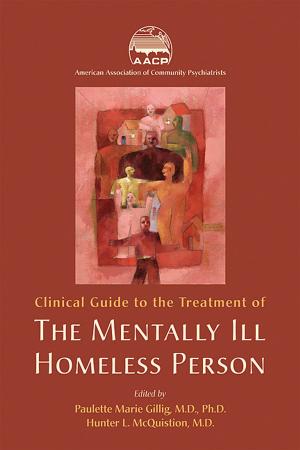Culture and Psychotherapy
A Guide to Clinical Practice
Nonfiction, Health & Well Being, Medical, Specialties, Psychiatry| Author: | ISBN: | 9781585628087 | |
| Publisher: | American Psychiatric Publishing | Publication: | November 1, 2008 |
| Imprint: | American Psychiatric Association Publishing | Language: | English |
| Author: | |
| ISBN: | 9781585628087 |
| Publisher: | American Psychiatric Publishing |
| Publication: | November 1, 2008 |
| Imprint: | American Psychiatric Association Publishing |
| Language: | English |
Cultural diversity has always been a fact of life, nowhere more so than in the unique melting pot of U.S. society. Respecting and understanding that diversity is an important -- and challenging -- goals. Culture and Psychotherapy: A Guide to Clinical Practice brings us closer to that goal by offering a fresh perspective on how to bring an understanding of cultural diversity to the practice of psychotherapy to improve treatment outcomes.
This remarkable work presents the nuts and bolts of incorporating culture into therapy, in a way that is immediately useful and practical. Illustrated by numerous case studies that demonstrate issues, techniques, and recommendations, the topics in this wide-ranging volume focus not on specific race or ethnicity but instead on culture. Introduction -- Summarizes the influence of culture (an abstract concept defined as an entity apart from race, ethnicity, or minority) on the practice and process of psychotherapy while offering a broadened definition of psychotherapy as a special practice involving a designated healer (or therapist) and identified client (or patient) to solve a client's problem or promote a client's mental health Case Presentations and Analysis -- Illustrates distinctive cultural issues and overtones within psychotherapy, such as the traditional Japanese respect for authority figures, the Native American concept of spirit songs, the clash of modern values with traditional Islamic codes, and the effects of the conflict between Eastern values of dependence and group harmony and Western values of independence and autonomy Specific Issues in Therapy -- Discusses lessons from folk healing, the cultural aspects of the therapist-patient relationship, and the giving and receiving of medication as part of therapy Treating Special Populations -- Presents issues and trauma faced by African Americans, Hispanic veterans, Southeast Asian refugees, adolescents, and the ethnic minority elderly Special Models of Therapy -- Shows the interplay between cultural issues and specific models of therapy, including marital therapy for intercultural couples and group therapy with multiethnic members
The relevance of cultural diversity will only grow stronger in the coming years as our definition of community expands to embrace global -- not just local -- issues. With its balanced combination of clinical guidance and conceptual discussion highlighted by fascinating case studies, this volume, authored by national and international experts, offers psychotherapists, psychiatrists, psychologists, psychiatric residents, psychiatric nurses, and mental health social workers -- both in the U.S. and abroad -- an expansive focus and richness of content unmatched elsewhere in the literature.
Cultural diversity has always been a fact of life, nowhere more so than in the unique melting pot of U.S. society. Respecting and understanding that diversity is an important -- and challenging -- goals. Culture and Psychotherapy: A Guide to Clinical Practice brings us closer to that goal by offering a fresh perspective on how to bring an understanding of cultural diversity to the practice of psychotherapy to improve treatment outcomes.
This remarkable work presents the nuts and bolts of incorporating culture into therapy, in a way that is immediately useful and practical. Illustrated by numerous case studies that demonstrate issues, techniques, and recommendations, the topics in this wide-ranging volume focus not on specific race or ethnicity but instead on culture. Introduction -- Summarizes the influence of culture (an abstract concept defined as an entity apart from race, ethnicity, or minority) on the practice and process of psychotherapy while offering a broadened definition of psychotherapy as a special practice involving a designated healer (or therapist) and identified client (or patient) to solve a client's problem or promote a client's mental health Case Presentations and Analysis -- Illustrates distinctive cultural issues and overtones within psychotherapy, such as the traditional Japanese respect for authority figures, the Native American concept of spirit songs, the clash of modern values with traditional Islamic codes, and the effects of the conflict between Eastern values of dependence and group harmony and Western values of independence and autonomy Specific Issues in Therapy -- Discusses lessons from folk healing, the cultural aspects of the therapist-patient relationship, and the giving and receiving of medication as part of therapy Treating Special Populations -- Presents issues and trauma faced by African Americans, Hispanic veterans, Southeast Asian refugees, adolescents, and the ethnic minority elderly Special Models of Therapy -- Shows the interplay between cultural issues and specific models of therapy, including marital therapy for intercultural couples and group therapy with multiethnic members
The relevance of cultural diversity will only grow stronger in the coming years as our definition of community expands to embrace global -- not just local -- issues. With its balanced combination of clinical guidance and conceptual discussion highlighted by fascinating case studies, this volume, authored by national and international experts, offers psychotherapists, psychiatrists, psychologists, psychiatric residents, psychiatric nurses, and mental health social workers -- both in the U.S. and abroad -- an expansive focus and richness of content unmatched elsewhere in the literature.















